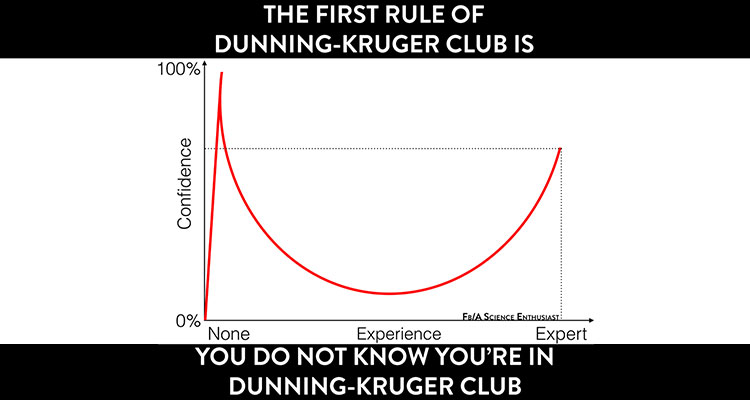Dunning-Kroeger [sic] in Effect
 We’ve all dealt with people who get more and more adamant, even as they get more and more wrong. Maybe it’s a coworker who swears up and down that they never got your TPS reports (even though you can see them sitting on their desk!). Maybe it’s a customer who tries to change the scope of their system after it’s been installed and commissioned (even though you have the original scope in writing!). Maybe it was even you, but you just didn’t recognize it.
We’ve all dealt with people who get more and more adamant, even as they get more and more wrong. Maybe it’s a coworker who swears up and down that they never got your TPS reports (even though you can see them sitting on their desk!). Maybe it’s a customer who tries to change the scope of their system after it’s been installed and commissioned (even though you have the original scope in writing!). Maybe it was even you, but you just didn’t recognize it.
The state of blind ignorance that leaves a person unable to acknowledge their own shortcomings is often referred to on the internet as “my stupid cow-irkers,” but there is an actual name for it. It’s called the Dunning-Kruger Effect, and it refers to the blind spot in our own psychology where we are so completely uninformed about something, we become totally unaware of our own wrongness.
Dunning and Kruger observed this phenomenon when giving test subjects a test and then quizzing them about how they thought they had done. The subjects in the middle of the bell curve tended to rate themselves as average, but the people who had done either extremely well or extremely poorly were wildly inaccurate in their self-assessments. Those who had done well mostly rated themselves as having done only moderately well compared to their peers (the theory is that this is because they tend to assume that everyone else knows just as much as they do). And, finally, those who had done poorly mostly gave themselves high marks. They assumed they’d aced the test, even though they had gotten most of the answers wrong.
For more information about the Dunning-Kruger Effect, I would highly recommend Act Two of this episode of This American Life.
(The Dunning-Kruger Effect has been the subject of some scientific debate, but for the purposes of this article it has enough Stephen Colbert-style truthiness to serve as our launch pad).
The Dunning-Kruger Effect is particularly insidious, because by definition it’s impossible to detect in yourself. It’s like walking around with halitosis and a head cold. You’re not going to sniff it out. And most people are so insufferable about it, they’re not likely to have anyone give them gentle feedback about it. So how do we protect ourselves from our own (and others) bravado? I have a few suggestions.
Trust, But Verify
There’s nothing worse than a coworker who talks a big game, but can’t back it up. So how do you avoid hiring those people in the first place? Don’t just take them at their word. Have our good friends at Tier PM screen candidates for you. Give them real world skills tests and/or questions. Speak with all of their references. If I was hiring a programmer, I would ask to see some examples of their code. If you were hiring an audio engineer, you could ask them to put together a basic DSP file for you. When I got my first job as a technician, the hiring manager gave me a CTS practice test to fill out. I didn’t get every single answer correct, but I got most of them. And he was able to ask me follow-up questions about my reasoning about the questions I did get wrong. It was a good way for him to see how I would go about troubleshooting a problem. In that same fashion, taking a certification exam (or just a practice exam) can give you objective information about what questions you might have gotten wrong.
Use the Right Tools
I still remember the ignominy of a grade-school teacher berating me in front of our entire class for not checking my work on an assignment. My big mistake? I had spelled a word wrong. I tried to tell her that I couldn’t check my own spelling if it was my spelling knowledge that was faulty in the first place. She didn’t listen to me. These days, kids just use spellcheck. If the line is red, you need to fix it. It takes your own ignorance out of the equation.
Error checking and QA should be designed to eliminate your own blind spots. If you ever find yourself saying, “Well… that’s how it’s supposed to work,” when something gets flagged, you’re probably doing it wrong. On the first episode of my podcast, The Floating Point, Toine Leerentveld from Crestron told us about the software they use (Coverity) to ensure that their software engineers don’t introduce vulnerabilities and adhere to best practices. Most of us don’t have the luxury of automated error checking, but we can at least ask a trusted coworker to double check our math for us when it’s something really important.
Show Your Work
If my boss asks me how long I think it will take to do a project and I say “six hours,” he’ll say “OK.” If I say “one hour to write a Simpl# module, two hours to write the base code, and three hours to modify it for the other 10 processors,” he’s going to ask me if I’ve lost my freaking mind. And then he’s going to revise my estimate. Heavily. Letting him in on my thought process lets him see where I went wrong and provide error checking. Even the act of explaining your reasoning can give you that nudge that says, “wait a minute…”
A similar strategy can be employed in other areas of our industry as well. I recently spoke with a client who told me that a job their integrator thought would take two days ended up taking two weeks to complete. That’s a terrible situation for everyone involved. The integrator likely lost money on the job, and the client had to wait an extra week and a half for the completion of their project.
Following best practice guides for drafting proposals and documenting scope should protect everyone. There are some great resources out there that you can use to assess proposals. I would recommend starting with the white papers on InfoComm’s website.
Don’t Surround Yourself With Yes People
Earlier this week, I tried to do some programming that ended up being slightly outside my own comfort zone. I thought I was doing great… until I bricked my test processor. “I am the living embodiment of Dunning-Krueger today!” I joked with my podcasting co-host, Chris Tatton. “You know it’s spelled Dunning-Kruger, right?”, he said. Whoops.
(N.B.: Spellcheck thinks that Krueger is a perfectly fine spelling. Even automated error checking is fallible. We’re probably all doomed.)
My point is, I have friends and coworkers who are willing to tell me when I’m being an idiot. And I’m willing to listen to them. Which means that I have a real shot at learning from my mistakes. If I’m ever inclined to tell someone they’re wrong when they correct me, I let Google be our tie-breaker. And it doesn’t count if you click through 20 pages to find the one website that agrees with you.
Don’t Aim to be the Smartest Person in the Room
When I’m at trainings and conventions, I try to spend my time with people who have demonstrated knowledge beyond my own (I think I’m pretty good at sussing those folks out, but as this article demonstrates, I may be horribly, horribly wrong about this one). Not only do all of these smart people teach me all sorts of interesting and wonderful things, seeing the advanced work that they’re doing allows me to re-calibrate my senses about my own abilities.
I can’t tell you how nerve-wracking it is to write an article about the mistakes you don’t know you’re making and worry that I have mixed up your/you’re somewhere in my writing. If you think I’m off-base about any of this, please leave a comment and let me know. I’d welcome the feedback.





